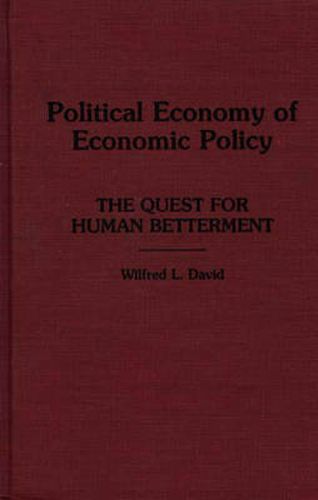Readings Newsletter
Become a Readings Member to make your shopping experience even easier.
Sign in or sign up for free!
You’re not far away from qualifying for FREE standard shipping within Australia
You’ve qualified for FREE standard shipping within Australia
The cart is loading…






David takes as his point of departure the orthodox rational paradigm of public policy-making–which, he argues, does not adequately reflect real-world process–to present an integrated model for economic policy formulation and execution. By juxtaposing the theoretical foundations of the rationalist model with insights drawn from alternative systems of political economy, he shows how economic decisionmaking is both more complex and less idealistic than the rational paradigm assumes. In constructing his argument, David systematically integrates ideas drawn from moral philosophy, politics, sociology, systems theory, institutional and neo-Marxian economic thought, and international dimensions of poitical economy. He suggests a reorientation of theory and analysis based on an approach emphasizing the role of values, conflicts, power, and divergent interests in the decisionmaking process. Focusing throughout on questions raised by the rationalist model, David builds his analysis around issues such as: the validity of the dominant theories of public economic decision-making; the logical vis-a-vis ideological foundations of economic policy postulates; the extent to which decisions can be made more responsive to values pertaining to human development.
$9.00 standard shipping within Australia
FREE standard shipping within Australia for orders over $100.00
Express & International shipping calculated at checkout
David takes as his point of departure the orthodox rational paradigm of public policy-making–which, he argues, does not adequately reflect real-world process–to present an integrated model for economic policy formulation and execution. By juxtaposing the theoretical foundations of the rationalist model with insights drawn from alternative systems of political economy, he shows how economic decisionmaking is both more complex and less idealistic than the rational paradigm assumes. In constructing his argument, David systematically integrates ideas drawn from moral philosophy, politics, sociology, systems theory, institutional and neo-Marxian economic thought, and international dimensions of poitical economy. He suggests a reorientation of theory and analysis based on an approach emphasizing the role of values, conflicts, power, and divergent interests in the decisionmaking process. Focusing throughout on questions raised by the rationalist model, David builds his analysis around issues such as: the validity of the dominant theories of public economic decision-making; the logical vis-a-vis ideological foundations of economic policy postulates; the extent to which decisions can be made more responsive to values pertaining to human development.